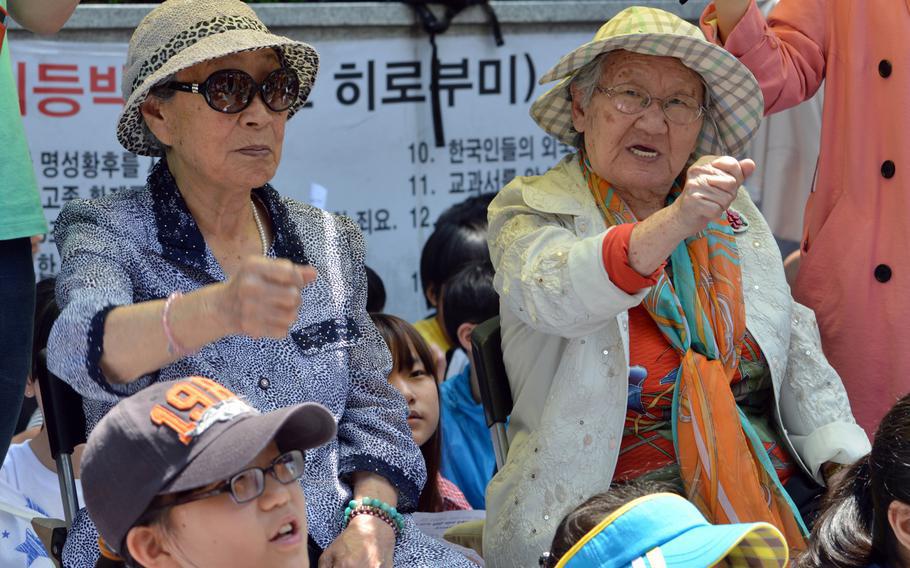
Bok-dong Kim, left, and Won-ok Gil chant during a protest near the Japanese Embassy in Seoul, South Korea, May 21, 2014. Both women were forced into prostitution by Japan during World War II. (Stars and Stripes)
CAMP HUMPHREYS, South Korea — South Korea’s government is pushing forward a plan to resolve its decades-long quarrel with Japan over the compensation for forced-labor victims during World War II.
A government foundation will fund reparations for South Koreans forced into wartime labor during Japan’s colonial rule, rather than continuing to demand Tokyo compensate them, South Korean Foreign Minister Park Jin announced at a news conference Monday.
Seoul is “determined to develop Korea-Japan relations” while “respecting the opinions of the forced labor victims,” Park said.
“The government has a lot of sympathy for the forced-labor victims’ anguish and pain that they went through for a long time and will make the utmost effort to try to heal the pain and wounds of the aged victims and bereaved families of forced labor victims,” he added.
Roughly 53,000 people in Korea were forced by Japan’s military to work in factories from 1910 to 1945, according to the Foundation for Victims of Forced Mobilization by Imperial Japan.
Thousands of Korean women were also forced to become sex workers for Japanese forces. Only 11 registered survivors of wartime sexual slavery were alive as of last year, according to a Hankyoreh report in May.
Monday’s announcement was met with criticism from the Korean Confederation of Trade Unions, one of the largest unions in the country with over 1.2 million members.
“In this solution, we can’t find a direct apology from the Japanese government for the forced labor issue,” the union said in a statement. It stated that Japanese businesses have an “obligation to compensate” the victims.
The foundation will also boost awareness of the wartime atrocities through an education campaign and the creation of research projects so that people “remember the suffering and pain … and pass them down to future generations,” Park said.
“The government hopes that Japan and South Korea are able to make efforts together to overcome the past unfortunate history and develop future-oriented relations based on reconciliation and good neighborly relations and cooperation,” he added.
South Korea’s Ministry of Foreign Affairs first floated the plan in January during a public forum, where it said the foundation could be funded by donations from domestic companies that benefited from a South Korea-Japan treaty that normalized relations in 1965.
Under that agreement, Japan provided South Korea with $300 million in grants and an additional $200 million in low-interest loans to address Tokyo's occupation of Seoul and wartime grievances.
Ample reparations for the wartime victims have historically divided diplomatic relations between Seoul and Tokyo. The Japanese government maintains that the wartime labor issues were settled after the 1965 treaty while several rulings from South Korea’s Supreme Court deemed that Japanese firms that benefited from the laborers still needed to compensate the victims.
Since his inauguration in May, South Korean President Yoon Suk Yeol has vowed to bridge that divide with Japanese Prime Minister Fumio Kishida, particularly in the wake of a continuing threat from North Korea.
In a national address in Seoul on March 1, a holiday that honors the country’s independence movement against Japan’s colonial rule, Yoon described Japan as a valued ally.
“Now, a century after the March 1st Independence Movement, Japan has transformed from a militaristic aggressor of the past into a partner that shares the same universal values as us,” he said. “Today, Korea and Japan cooperate on issues of security and economy. We also work together to cope with global challenges.”
Secretary of State Antony Blinken said in a statement Monday that he welcomed the “historic announcements … regarding the conclusion of discussions on sensitive historical issues.”
“[South Korea] and Japan are two of the United States’ most important allies, and we are inspired by the work they have done to advance their bilateral relations,” he said.
Stars and Stripes reporter Yoo Kyong Chang contributed to this report.